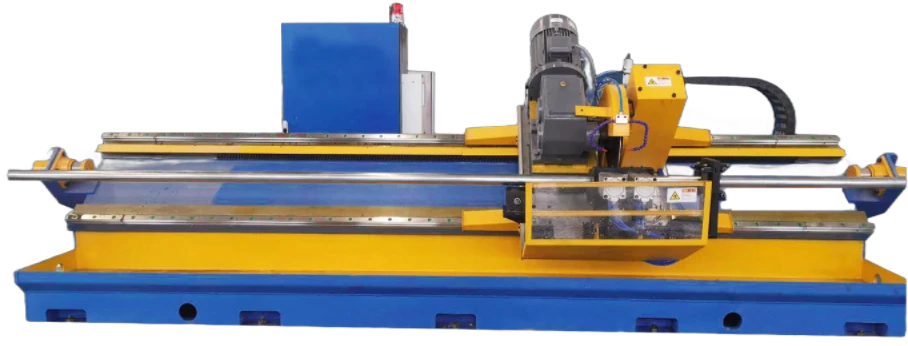Advanced Technologies in Pipe Manufacturing Machines for Efficient Production
Understanding Pipe Mill Machines An Essential Tool for Modern Manufacturing
In the realm of modern manufacturing, the pipe mill machine stands out as a crucial piece of equipment. It's integral in producing various types of pipes used across numerous applications, from construction to automotive industries. This article delves into the functionalities, types, and significance of pipe mill machines in the manufacturing landscape.
What is a Pipe Mill Machine?
A pipe mill machine refers to a specialized piece of machinery designed to create pipes through various processes such as forming, welding, and finishing. The end products can range from small, thin-walled tubes to large, thick-walled pipes. Typically, these machines operate using continuous processes, enabling high production rates ideal for industrial applications. Pipe mill machines can process materials such as carbon steel, stainless steel, and alloyed metals, depending on the requirements of the final product.
The Operating Principle
The operation of a pipe mill machine typically involves several key stages.
1. Material Preparation Initially, raw material in the form of flat steel strips or coils is fed into the machine. These materials are often pre-treated to eliminate impurities.
2. Forming The flat strips are passed through rollers, which gradually shape them into a cylindrical form. This stage requires precision and advanced technology to ensure uniformity in the pipe's dimensions.
3. Welding After forming, the edges of the rolled strip need to be joined together. This is usually achieved through electric resistance welding or high-frequency welding, where the edges are heated and fused. The welding process is crucial because it determines the integrity and strength of the final product.
4. Finishing Once welded, the pipe moves into the finishing stages. This can include trimming to specific lengths, surface treatment to enhance corrosion resistance, and quality checks to meet industry standards.
5. Quality Control Modern pipe mill machines are equipped with various sensors and automated systems to monitor the manufacturing process. This ensures that any deviations from desired specifications are corrected immediately, thereby maintaining consistent quality.
Types of Pipe Mill Machines
Pipe mill machines vary based on their design and the specific pipes they produce. Here are some common types
pipe mill machine

- High-Frequency Welded (HFW) Pipe Mills These machines are ideal for producing pipes with a smaller diameter and thinner walls. They use high-frequency electrical currents to weld the edges of the material.
- ERW (Electric Resistance Welded) Pipe Mills Similar to HFW, ERW machines are often used for medium to large diameters. They offer flexibility in terms of material types and thicknesses.
- SAW (Submerged Arc Welded) Pipe Mills These machines utilize a submerged arc welding technique, making them suitable for producing large diameter pipes used in oil and gas transportation.
- Seamless Pipe Mills Unlike the welded variety, seamless pipe mills produce pipes without any seams. The manufacturing process involves forging and extrusion, which results in a stronger pipe ideal for high-pressure applications.
Importance of Pipe Mill Machines in Industry
The significance of pipe mill machines cannot be overstated. They play a vital role in various sectors, including
- Construction Pipes are essential for plumbing, drainage systems, and building frameworks.
- Oil and Gas Transporting resources safely over long distances requires high-quality pipes, and pipe mills provide the necessary manufacturing capabilities.
- Automotive Various automotive components involve pipes that have specific durability and flexibility requirements.
- Water Supply Reliable water supply systems depend on the efficient production of pipes that can withstand high pressures.
Conclusion
In conclusion, pipe mill machines are indispensable to modern manufacturing. They not only facilitate the production of essential materials needed across various industries but also contribute to advancements in technology and efficiency. As industries continue to evolve and demand higher standards, the role of pipe mill machines will only grow, reinforcing their importance in meeting the needs of tomorrow’s infrastructure and manufacturing processes. Whether it is through enhanced designs or increased automation, the future of pipe milling holds promising potential for innovation and sustainability.
-
High Frequency Straight Seam Welded Pipe Production Line-BzZhou Xinghua Machinery Equipment Manufacturing Co., LTD.|line pipe steel&welded gas pipeNewsJul.30,2025
-
High Frequency Straight Seam Welded Pipe Production Line-BzZhou Xinghua Machinery Equipment Manufacturing Co., LTD.|High Precision&Automated SolutionsNewsJul.30,2025
-
High Frequency Straight Seam Welded Pipe Production Line - BzZhou Xinghua Machinery Equipment Manufacturing Co., Ltd.NewsJul.30,2025
-
High Frequency Straight Seam Welded Pipe Production Line-BzZhou Xinghua Machinery Equipment Manufacturing Co., LTD.|Precision Welding, High EfficiencyNewsJul.30,2025
-
High Frequency Straight Seam Welded Pipe Production Line|BzZhou Xinghua|Precision Welding&EfficiencyNewsJul.30,2025
-
High Frequency Straight Seam Welded Pipe Production Line - BzZhou Xinghua|Precision Engineering&EfficiencyNewsJul.30,2025


